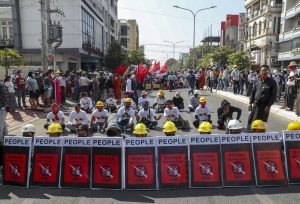At the start of February, Myanmar’s powerful military declared a state of emergency after toppling the elected government of Aung San Suu Kyi and the National League for Democracy (NLD), with a pledge of delivering a “free and fair” election within 12 months. It is unclear how the regime can effectively run the country in the face of a civil disobedience movement backed by swathes of the population, protests disrupting economic and financial activities, refusal from ethnic armed groups to engage, and a bureaucracy that has ground to a halt.
The junta’s cabinet appointees are similar to the 2011-2016 quasi-civilian administration of Thein Sein, but both the domestic situation and external environment point to a very different set of circumstances and challenges, with a return of sanctions, economic damage from COVID-19, investors mulling an exit, and the possibility of severe political instability as well as collapse of the banking and energy industries.
Protests across cities and towns have continued and a civil disobedience movement has shown no sign of abating weeks after the coup, despite explicit warnings from the regime and the use of force by the security forces. Senior General Min Aung Hlaing, the junta leader, summoned industry leaders and tycoons and stated the regime’s desire to welcome investments, but businesses are bracing for a very tough time while journalists and activists worry about the dramatic reversal of democratic freedom previously possible.
A senior worker at an international nongovernmental organization (INGO) in Myanmar warns that the prospect of any junta-supported election will face entrenched domestic and international skepticism. For one thing, the coup government has reappointed as chair of the Union Election Commission (UEC) the same individual who held the position during the 2010 election, in which the military’s proxy party, the Union Solidarity and Development Party (USDP) dominated amid widespread irregularities (and with the NLD refusing to take part). As a result, the INGO worker said, “the UEC’s credibility and perceived independence is at a nadir.”
“Operationally, elections will be a prime target for the civil disobedience movement,” the INGO worker continued.
“The institutional, legal, operational and political context that the junta has shaped around any prospective election it patronizes makes Senior General Hlaing’s ambitions of a ‘free and fair’ election a parody of democracy – and an insurmountable obstacle for the legitimacy he craves.”

































